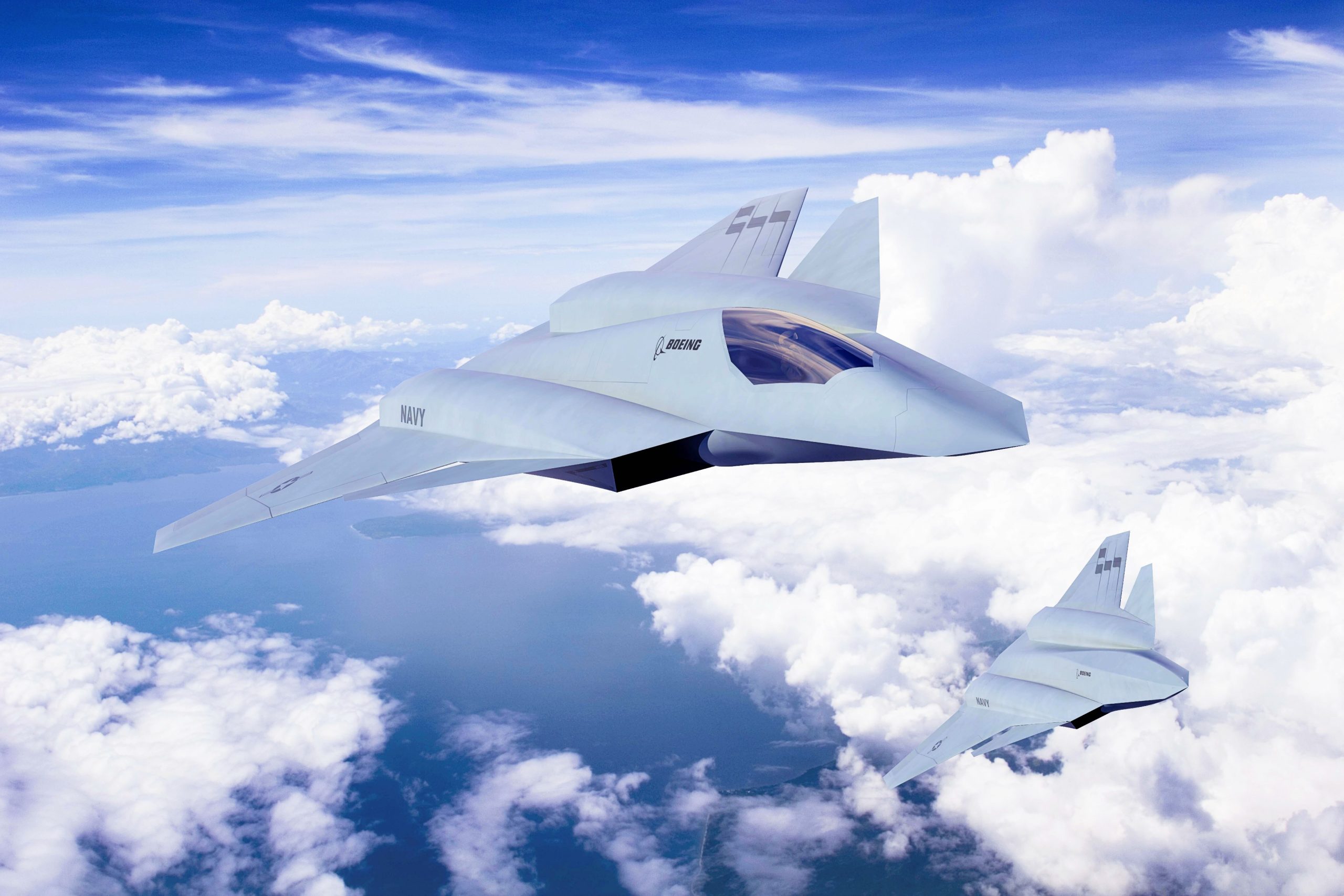While the US Navy has revealed an artist’s rendition of its F/A-XX strike fighter, its arch-rival China seems to have moved beyond the drawing board with its carrier-based FC-31.
The US Navy (USN) revealed a concept artwork for the next generation F/A-XX strike aircraft last week as part of an unclassified document titled ‘Navy Aviation Vision 2030-2035’. The F/A-XX is slated to replace the navy’s F/A-18 Super Hornets, and its development into the F/A-XX can be traced back to 2012.
The proposed aircraft is under the aegis of the Next Generation Air Dominance (NGAD) program. The War Zone reported that the US Navy may likely deploy the F/A-XX as a “quarterback” for a swarm of combat drones.
Equipped with Electronic Warfare (EW) suites, it will have command-and-control nodes. However, these roles are speculative at best without official confirmation.
The Latest Revelation
The concept released by US Navy shows a top-down view, depicting a lambda-wing shape design and canard foreplanes. Steve Trimble, the defense editor at Aviation Week, tweeted that the F/A-XX may have a “ruddervator” tailplane similar in broad strokes to ones seen on the Northrop-designed YF-23 stealth. Since the artwork is low in resolution, the image could very well have more traditional twin tails.
It is not clear whether this is the final design or there will be additional features. There is also speculation that the US Navy would reveal the specifications of a next-generation aircraft which is still under development. The War Zone noted that this concept is distinct from previous renditions of the F/A-XX showing tailless platforms.
That apart, USN is yet to formulate operational capabilities of the F/A-XX. According to reports, the F/A-XX is the strike fighter component within the NGAD family of systems (FoS). It will eventually replace the Super Hornets in the 2030s. Its specific capabilities and technologies are classified.

However, it is likely to have a longer range and greater speed, incorporate passive and active sensor technology, and possess the capability to employ longer-range weapons programmed for the future, according to reports.
“As the Super Hornets are retired from service, a combination of F-35C and F/A-XX will provide Navy tactical fighter aircraft capability and capacity within the CVW [carrier air wing]. The advanced carrier-based power projection capabilities resident in F/AXX will maintain CVN [aircraft carrier] relevance in advanced threat environments,” the report further read.
The Naval Aviation Vision 2030-2035 envisages the F/A-XX as the center of manned-unmanned teaming capabilities within the service’s future carrier air wings. This development will also likely complement the US military’s ‘loyal wingman’ efforts. But does it match the Chinese naval aviation developments?
China’s FC-31
Business Standard reported that the F/A-18 Super Hornets, which the upcoming F/A-XX is slated to replace, could kill the Chinese carrier-based J-15 Flying Shark. This hypothesis was, however, disputed by a long-term aviation watcher who told The EurAsian Times that “in close air combat, the J-15 should kill the F/A-18.”
The EurAsian Times recently reported that China is working on its latest carrier-based stealth aircraft. What began as speculation on social media became a reality following the emergence of images of what appeared to be a carrier-capable variant of the FC-31, China’s second stealth fighter that is yet to be inducted.
The images show the aircraft sporting a chin-mounted sensor turret, similar to the F-35’s Electro-Optical Targeting System (EOTS), and what appears to be a redesigned cockpit canopy layout with shorter primary transparency.
It is believed that this aircraft will operate from China’s upcoming Type 003 aircraft carrier, which is reportedly being outfitted with an electromagnetic aircraft launch system (EMALS) instead of ski-jump ramps seen on the PLAN’s previous two carriers, Liaoning and Shandong.
The EurAsian Times had reported that a silhouette of the FC-31 surfaced on the Aviation Industry Corporation of China’s Weibo microblogging site in December 2019. Following this, Shenyang revealed the development of a ‘new’ fighter, fueling rumors that it was the long-awaited FC-31 carrier variant.
The PLAN has already shown interest in acquiring a naval version of the FC-31. The KJ-600 and J-15T are all up in the air. A naval variant of the FC-31, which would also require heavier landing gear, could be ready in the near future.
These capabilities are intended toward achieving the goal of making PLAN a world-class navy by 2035, a vision outlined by none other than Chinese President Xi Jinping, who is also the chairman of the Central Military Commission.
- Aritra Banerjee is a defense journalist who has worked in both online and print media. He has laid an emphasis on issues related to military human resources, tactical psychology, military-media relations, professional military education, and combat fitness. He can be reached by email: aritrareporter@gmail.com.
- Follow EurAsian Times on Google News